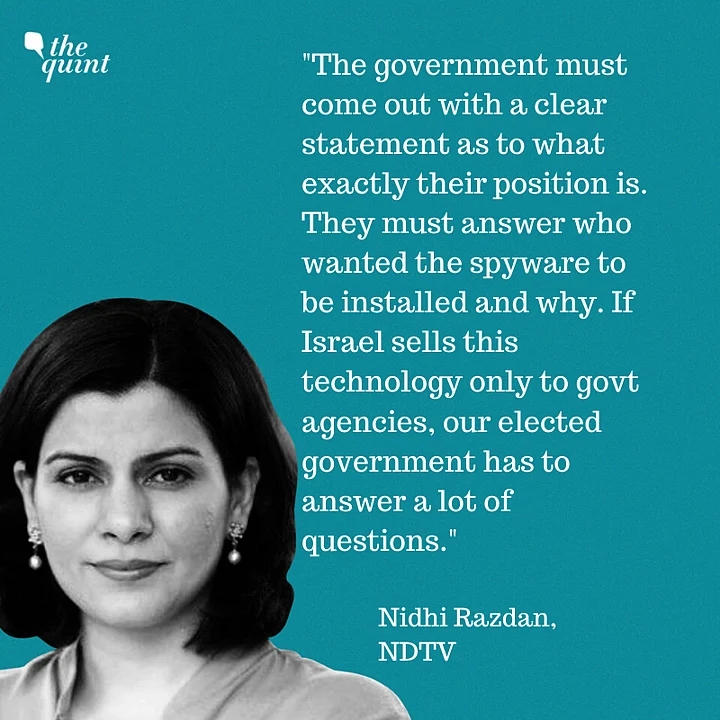Video Editor: Varun Sharma
When news emerged that WhatsApp accounts of at least two dozen journalists and social activists in India were among the 1,400 accounts hacked worldwide by Pegasus – a spyware developed by Israeli NSO Group – those in the media fraternity, including NDTV’s Ravish Kumar and veteran journalist Maya Mirchandani, were not surprised.
But what continues to worry them and others in the profession, is who ordered this form of surveillance and for what purpose. The Quint spoke to a number of journalists to see what they make of this shocking revelation.
Catch all the coverage on WhatsApp snooping here.
Listen to the Poor & Jobless Instead
Ravish Kumar, Senior Executive Editor at NDTV, says that in the last couple of years, he has been advised not to ‘trust’ his phone with sensitive conversations. This, the notable broadcast journalist feels, points to a ‘deep sense of distrust’ for the government among the masses, as even ordinary people have been insisting on WhatsApp calls.
“What will the government do by listening to our conversations?” he asks. “They should listen to conversations of the poor and the jobless.”

Kumar said that if the information that the snooping took place around May 2019 is true, then it raises some really serious questions.
“Rafale was in the news this time, there were other issues. Was it done to preempt these news, and to suppress sources? Someone was very afraid that his kingdom of falsehood would fall. Moreover, if someone has cracked the encryption, it can go on now. How do we know it hasn’t stopped after May?” he said.
Read Between the Lines
Like many other journalists, the news of a WhatsApp hack did not surprise Maya Mirchandani. The senior journalist says that the Indian state has long tried to access conversations and messages of journalists, citing threats to national security.
The problem, she says, is that this seems to be now “targeting those critical of the government, those vocal of what they see around them in terms of economic and social policy. This now beginning to stifle dissent.”

When asked about the timing of the hack, Mirchandani said that it could be timed to observe what people were saying or doing in the run-up to 2019 Elections. “Read between the lines,” she says.
Government Must Answer
NDTV’s Nidhi Razdan says she has always been suspicious of technology and that she suspects that journalists have been under the radar of both the BJP and the erstwhile UPA government. She, however, feels that it is incumbent upon the government to clarify if they had any role in this and why was it done.

Worst Apprehensions Come True
For a very long time, journalists have believed that somebody out there is watching them, says Suhasini Haidar, National and Diplomatic Affairs Editor at The Hindu. Today’s revelations, she says, have just confirmed the “worst apprehensions” of journalists who often are privy to sensitive information.
In earlier days, certain permissions were needed and guidelines had to be followed to tap into someone’s telephone if there were national security concerns. “But now, it seems that nobody has to prove any such charge to tap into our phones,” she adds.

Haidar, however, feels that this is not the first time journalists and social activists are being snooped upon and that WhatsApp could have only reported on among many such instances involving a security breach on its platform.
Echoing Razdan, she, too, says that if indeed government agencies are involved, “they must explain why they had hacked into people’s phones.”
Need Strong Data Privacy Infrastructure
Seema Chishthi, the Indian Express journalist whose report shed light on how WhatsApp accounts of Indian journalists and social activists were spied upon, stressed on the importance of strengthening the country's data privacy laws and Infrastructure. "Technology is a way of life and we need safeguards to ensure it is not misused by anybody," she said.

Newsrooms Must Guard Themselves
Praveen Swami, Group Consulting Editor at Network18, says that successive governments have resisted effective parliamentary oversight on the issue of surveillance. “Although helpful in combating terrorism, surveillance technology has invariably been used for illegal purposes, even by the UPA around ten years back,” he says.

Swami laments that despite repeated threats, newsrooms in India haven’t really taken steps to insulate themselves and their employees from snooping. “Newsrooms must train their journalists on how to tackle the menace of digital spying,” he adds.
(At The Quint, we are answerable only to our audience. Play an active role in shaping our journalism by becoming a member. Because the truth is worth it.)